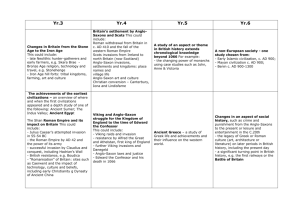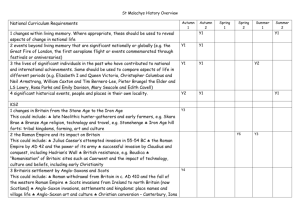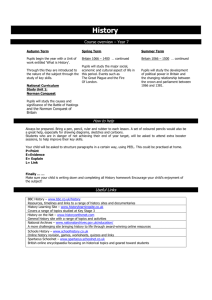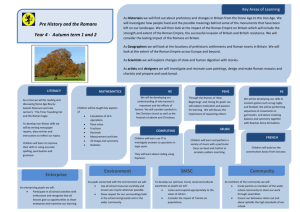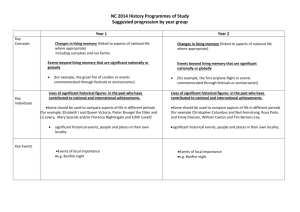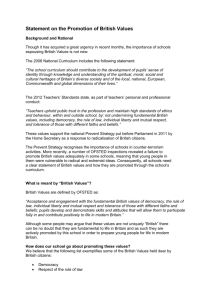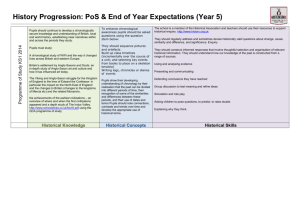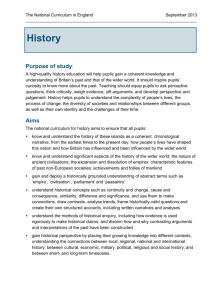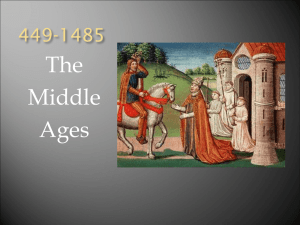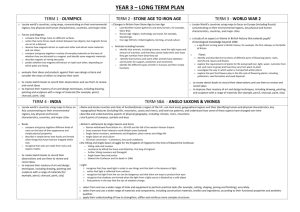Y3 History
advertisement
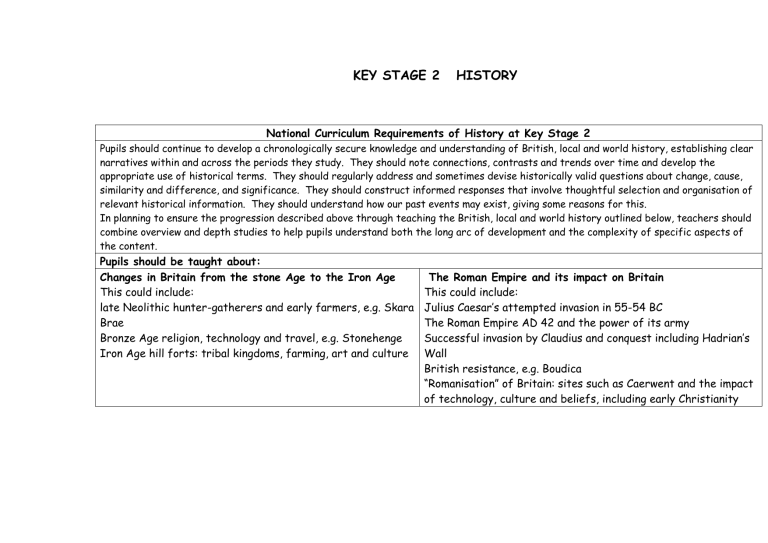
KEY STAGE 2 HISTORY National Curriculum Requirements of History at Key Stage 2 Pupils should continue to develop a chronologically secure knowledge and understanding of British, local and world history, establishing clear narratives within and across the periods they study. They should note connections, contrasts and trends over time and develop the appropriate use of historical terms. They should regularly address and sometimes devise historically valid questions about change, cause, similarity and difference, and significance. They should construct informed responses that involve thoughtful selection and organisation of relevant historical information. They should understand how our past events may exist, giving some reasons for this. In planning to ensure the progression described above through teaching the British, local and world history outlined below, teachers should combine overview and depth studies to help pupils understand both the long arc of development and the complexity of specific aspects of the content. Pupils should be taught about: Changes in Britain from the stone Age to the Iron Age This could include: late Neolithic hunter-gatherers and early farmers, e.g. Skara Brae Bronze Age religion, technology and travel, e.g. Stonehenge Iron Age hill forts: tribal kingdoms, farming, art and culture The Roman Empire and its impact on Britain This could include: Julius Caesar’s attempted invasion in 55-54 BC The Roman Empire AD 42 and the power of its army Successful invasion by Claudius and conquest including Hadrian’s Wall British resistance, e.g. Boudica “Romanisation” of Britain: sites such as Caerwent and the impact of technology, culture and beliefs, including early Christianity National Curriculum Requirements of History at Key Stage 2 Pupils should be taught about: Britain’s settlement by Anglo-Saxons and Scots This could include: Roman withdrawal from Britain in c.AD 410 and the fall of the western Roman Empire Scots invasion from Ireland to north Britain (now Scotland) Anglo-Saxon invasions, settlements and kingdoms: place names and village life Anglo-Saxon art and culture Christian conversion – Canterbury, Iona and Lindisfarne The Viking and Anglo-Saxon struggle for the Kingdom of England to the time of Edward the Confessor This could include: Viking raids and invasion Resistance by Alfred the Great and Athelstan, first king of England Further Viking invasions and Danegeld Anglo-Saxon laws and justice Edward the Confessor and his death in 1066 A local history study For example: a depth study linked to one of the British areas of study listed above a study over time tracing how several aspects of national history are reflected in the locality (this can go beyond 1066) a study of an aspect of history or a site dating from a period beyond 1066 that is significant in the locality A study of an aspect or theme in British history that extends pupils’ chronological knowledge beyond 1066 For example: the changing power of monarchs using case studies such as John, Anne and Victoria changes in an aspect of social history, such as crime and punishment from the Anglo-Saxons to the present or leisure and entertainment in the 20th Century the legacy of Greek or Roman culture (art, architecture or literature) on later periods in British history, including the present day a significant turning point in British history, e.g. the first railways or the Battle of Britain National Curriculum Requirements of History at Key Stage 2 Pupils should be taught about: The achievements of the earliest Ancient Greece – a study of Greek and achievements and their influence on the civilizations - an overview of where and western world when the first civilizations appeared and a depth study of one of the following: Ancient Sumer; The Indus Valley; Ancient Egypt; The Shang Dynasty of Ancient China A non-European society that provides contrasts with British history – one study chosen from: early Islamic civilisation, including a study of Baghdad c. AD 900; Mayan civilization c. AD 900; Benin (West Africa) c. AD 900 - 1300 Knowledge, Skills and Understanding breakdown for History Year 3 Chronological understanding Knowledge and interpretation Historical enquiry Can they describe events and periods using Do they appreciate That the early Brits Do they recognise the part that the words: BC, AD and decade? would not have communicated as we do or archaeologists have had in helping us Can they describe events from the past using have eaten as we do? understand more about what dates when things happened? Can they begin to picture what life would happened in the past? Can they describe events and periods using have been like for the early settlers/ Can they use various sources of the words: ancient and century? Can they recognise that Britain has been evidence to answer questions? Can they use a timeline within a specific time invaded by several different groups over Can they use various sources to piece in history to set out the order things may have time? together information about a period happened? Do they realise that invaders in the past in history? Can they use their mathematical knowledge to would have fought fiercely, using hand to Can they research a specific event work out how long ago events would have hand combat? from the past? happened? Can they suggest why certain events Can they use their ’information happened as they did in history? finding’ skills in writing to help them Can they suggest why certain people acted write about historical information? as they did in history Can they through research identify similarities and differences between given periods in history? Year 3 (Challenging) Can they set out on a timeline, within a given Can they begin to appreciate why Britain Can they begin to use more than one period, what special events took place? would have been an important country to source of information to bring Can they begin to recognise and quantify the have invaded and conquered? together a conclusion about an different time periods that existed between Can they appreciate that war/s would have historical event? different groups that invaded Britain? inevitably have brought much distress and Can they use specific search engines bloodshed? on the Internet to help them find Do they have an appreciation that wars information more rapidly? start for specific reasons and can last for a long time? Do they appreciate that invaders were often away from their homes for very long periods and would have been ‘homesick’?
